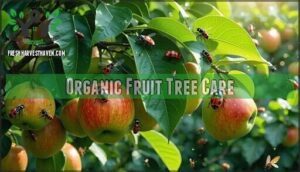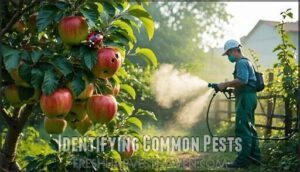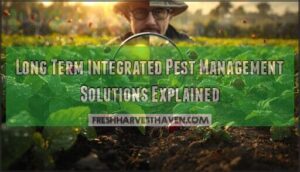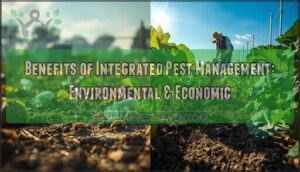This site is supported by our readers. We may earn a commission, at no cost to you, if you purchase through links.
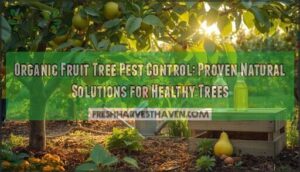
By using natural techniques, you’ll protect your trees from pests and preserve the environment.
Regular pruning, soil management, and water conservation are key.
You’ll also learn about beneficial insects, companion planting, and homemade organic sprays.
Understanding common pests and their signs is essential.
As you explore these methods, you’ll discover how to create a balanced ecosystem, ensuring your fruit trees thrive without harming the environment, and that’s just the beginning of growing healthy and pest-free fruit trees.
Table Of Contents
- Key Takeaways
- Organic Fruit Tree Care
- Natural Pest Management
- Identifying Common Pests
- Organic Pest Control Methods
- Safe Spraying Practices
- Frequently Asked Questions (FAQs)
- What is the best organic pesticide for fruit trees?
- What is the best pest control for fruit trees?
- How to protect fruit trees from insects naturally?
- How to grow fruit trees without pesticides?
- Can you use vinegar as pest control on fruit trees?
- How do you get rid of fruit tree bugs naturally?
- How to protect fruit trees without pesticides?
- What can I put on my fruit tree to keep bugs away?
- How do you keep bugs off fruit trees organically?
- What is a natural pest control for fruit trees?
- Conclusion
Key Takeaways
- You’ll protect your fruit trees from pests and preserve the environment by using natural techniques like regular pruning, soil management, and water conservation.
- To control pests, you can use homemade organic sprays, neem oil, and insecticidal soap, which are safer for your trees and the environment.
- You’ll need to identify common pests affecting your fruit trees, like aphids and spider mites, by recognizing leaf damage indicators, fruit infestation signs, and other symptoms.
- By applying organic pest control methods and maintaining a balanced ecosystem, you’ll master growing healthy trees and enjoying pest-free fruit, all while preserving the environment.
Organic Fruit Tree Care
You’ll start by learning about organic fruit tree care, which involves regular pruning techniques, soil nutrient management, and water conservation methods.
Start with organic fruit tree care for a healthy harvest
By following these practices, you’ll be able to create a healthy environment for your trees to thrive, making them more resistant to pests and diseases, through effective management.
Regular Pruning Techniques
You prune your fruit trees to prevent pest issues.
Pruning timing is vital, with winter pruning removing diseased wood and improving air circulation.
Use sharp tools for precise cuts, applying proper shaping techniques for disease prevention and pest prevention in fruit tree care, maintaining healthy trees through regular branch selection and tool maintenance, which is crucial for overall pest control.
Soil Nutrient Management
You’re shaping your trees with pruning techniques, now it’s time to focus on their foundation: soil health. Healthy soil is key to thriving fruit trees and natural pest resistance.
Test your soil to identify nutrient deficiencies and apply organic amendments like compost, worm castings, and green manure. Mycorrhizal fungi enhance nutrient uptake, while compost teas provide quick boosts.
Balancing Soil pH and addressing nutrient deficiencies are essential for fruit tree care and organic pest control. By using compost application and green manures, you’ll promote soil health, supporting organic farming and pest prevention, which is central to organic fruit tree pest control.
To further boost your soil’s health, consider amending soil properly with organic matter, which will help with organic pest control and support thriving fruit trees through natural pest resistance and organic farming.
Water Conservation Methods
You’re taking a vital step in organic pest control by managing water efficiently.
To do this, consider:
- Efficient Irrigation systems
- Rainwater Harvesting
- Drought-Resistant Varieties
- Soil Moisture Monitoring
- Water-Wise Mulching.
Proper watering prevents stress, making trees less vulnerable to fruit tree pests.
By using these methods, you’ll reduce the risk of pest infestations and create a healthier environment for your trees to thrive, which is key to successful organic gardening and sustainable pest management strategies.
Mulching Benefits and Techniques
By mulching, you’re creating a protective shield against fruit tree pests.
Choose suitable Mulch Types, considering Application Timing and Mulch Depth for ideal Weed Suppression and Soil Moisture retention, aiding in organic pest control and overall fruit tree care.
Natural Pest Management
You’re taking a vital step in maintaining healthy fruit trees by exploring natural pest management methods.
By using techniques like beneficial insect attraction, companion planting, and physical barriers, you can effectively control pests without harming the environment or your trees, which is a key aspect of environmental care.
Control pests naturally for a healthier environment
Beneficial Insect Attraction
Now that your trees are pruned and the soil is ready, let’s invite some friends. You can boost your organic pest control by attracting beneficial insects. Think of it as hiring tiny bodyguards for your fruit trees.
Planting dill and marigolds is like ringing the dinner bell for ladybugs and lacewings. They’ll feast on fruit tree pests. You can create lacewing habitats with straw bundles. Nectar-rich blooms are great for parasitic wasps. You can also use an attractant plant selection product to boost their presence. To further enhance this, consider using a specialized insect attractant.
Here are some ways to attract beneficial insects:
- Plant native flowering plants.
- Provide a shallow water source.
- Create shelter options.
- Reduce pesticide use.
- Promote garden biodiversity.
Companion Planting Techniques
You’ll use companion planting, pairing fruit trees with herbs and flowers, to attract pollinators and repel pests, improving soil health and biodiversity, while optimizing space, and creating a balanced ecosystem for organic pest control.
Utilizing pest repellents and natural methods to control fruit tree pests, is crucial for a healthy garden. Planting umbelliferous flowers can attract beneficial insects to further enhance pest control.
Physical Barriers for Pest Control
Now that you know about companion planting, let’s talk physical barriers.
These are simple, effective tools for organic pest control. Think of them as armor for your fruit trees!
- Copper Bands: Wrap trunks to deter slugs, snails.
- Tree Collars: Block crawling fruit tree pests.
- Sticky Traps: Catch insects climbing trunks.
- Tree Netting: Shield fruit from birds, larger pests.
Consider these for thorough fruit tree protection. Row Covers and Trunk Wraps boost barrier effectiveness. Remember, cultural and mechanical controls enhance pest control.
Identifying Common Pests
You’ll need to identify common pests affecting your fruit trees to apply the right organic pest control methods.
By recognizing leaf damage indicators, fruit infestation signs, and other symptoms, you can take action to protect your trees and guarantee a healthy harvest.
Leaf Damage Indicators
You’re inspecting your fruit tree’s leaves for signs of pests. Look for leaf discoloration, leaf curling, or spot patterns. Chewed edges and web presence can also indicate infestation.
Early detection is important because identifying common garden pests is vital for effective treatment.
| Indicator | Description |
|---|---|
| Holes | Caterpillars |
| Discoloration | Aphids |
| Frass | Borers |
| Sap | Scale |
| Web | Spider mites |
Identify these leaf damage indicators to prevent pest infestation and apply fruit tree pest solutions.
Fruit Infestation Signs
You’ll notice fruit infestation signs like irregular holes, discoloration, or decay on the fruit surface.
Premature fruit drop and unusual growth can also occur.
Check for pest entry points and internal changes.
Early pest identification is essential for effective fruit tree pest prevention and management, ensuring healthy trees and pest-free fruit.
Bark and Branch Symptoms
You’ll identify bark and branch issues by checking for canker identification, gummosis causes, and lichen growth.
Borer damage and stress can lead to gummosis, while sunscald prevention helps avoid cracked bark, promoting fruit tree health and pest prevention through proper maintenance and pest identification techniques.
Root System Pest Detection
To detect root system pests, you’ll conduct a soil examination, checking for stunted growth or yellowing leaves.
Soil sampling and nematode identification help uncover issues, while root examination reveals larval detection and fungal presence.
This information guides your organic pest control approach for effective fruit tree pest management and garden pest control.
Organic Pest Control Methods
You’ll learn how to control pests using organic methods, which are safer for your trees and the environment.
By using homemade sprays, neem oil, and insecticidal soap, you can effectively manage pests and keep your fruit trees healthy.
Homemade Organic Spray Recipes
You can create homemade organic sprays using natural ingredients like cinnamon oil, chili powder, and essential oil blends.
Try a garlic pepper spray or mix Spinosad with soap for effective pest control.
Diatomaceous earth and DIY organic sprays also work well, keeping your fruit trees healthy and pest-free naturally.
You can also use ingredients like onions and garlic for natural insect repellent.
Neem Oil Applications
To manage pests, use neem oil. Here are key points:
- Mix 2 tablespoons neem oil with water
- Apply every 7-14 days
- Target aphids and spider mites
- Spray in early morning or evening for best results, using neem oil for natural pest control.
It’s effective against many insect pests.
Insecticidal Soap Uses
You’ll use insecticidal soap for soft-bodied pests like aphids and spider mites.
- Mix 1-2 tablespoons of soap per gallon of water
- Test for plant sensitivity
- Apply during cooler hours
Explore soap alternatives like castile soap for natural pest control, considering Soap Application Timing and Target Pest Spectrum.
Aphids, known for their rapid reproduction, can be managed with consistent garden monitoring, and this is crucial for effective pest management.
Safe Spraying Practices
You’re taking the right step by considering safe spraying practices for your organic fruit tree pest control.
By following proper techniques, you’ll minimize risks to yourself, your trees, and the environment, ensuring a healthy and thriving orchard.
Proper Spraying Equipment Selection
When selecting sprayer types, consider durable tank materials like stainless steel.
Nozzle selection matters for even coverage. Choose the right nozzle and calibrate to prevent overuse.
Regular maintenance tips include cleaning thoroughly after each use to avoid clogs.
Consider different organic sprayer options for best results. This guarantees your garden tools, like a garden hose, work efficiently with organic sprays to achieve the desired outcome with minimal waste.
Safety Precautions for Spray Application
When applying organic sprays, wear protective gear like gloves and goggles.
Consider spray timing, avoiding harsh weather conditions.
Make certain safe storage and child safety. Always patch test and check for adverse reactions to maintain garden safety with organic sprays and proper application techniques.
Environmental Impact Considerations
When you spray, remember your garden’s part of a bigger picture.
- Consider runoff reduction.
- Think about residue effects.
- Evaluate biodiversity impact.
- Prioritize soil health.
Organic gardening cuts chemical runoff and protects water conservation. This boosts biodiversity and soil health.
Ecofriendly pest control lowers your environmental impact, supporting sustainable practices. Your spray choices matter for environmental protection.
So, use organic solutions. They nurture your trees and the planet. Companion planting naturally deters pests. It’s a key part of maintaining ecosystem health. Let’s keep pesticide residues away, for environmental protection.
Frequently Asked Questions (FAQs)
What is the best organic pesticide for fruit trees?
Neem oil stands out as a top pick for organic tree care.
It breaks pest life cycles, is safe for beneficial bugs, and keeps fruit healthy.
A little patience, steady reapplication, and you’ll see results.
What is the best pest control for fruit trees?
You’ll get the best pest control by mixing natural sprays—like oil, soap, and neem oil—with regular inspections and handpicking.
Attract helpful bugs. Rotate crops, keep your trees healthy, and you’ll leave pests with nowhere to hide, which is the key to natural pest control.
How to protect fruit trees from insects naturally?
Did you know aphids can double their population in just a week?
You can protect fruit trees by introducing ladybugs, using insecticidal soap, and encouraging biodiversity.
Regularly check leaves, act early, and avoid harsh chemicals for healthier fruit.
How to grow fruit trees without pesticides?
You can grow fruit trees without pesticides by using natural methods, such as introducing beneficial insects, practicing crop rotation, and maintaining healthy soil to enhance plant resistance to pests naturally.
Can you use vinegar as pest control on fruit trees?
You’ll be surprised, but vinegar can be used as a pest control on fruit trees, offering a natural alternative to chemicals, although its effectiveness varies depending on pest type.
How do you get rid of fruit tree bugs naturally?
You can eliminate fruit tree bugs naturally by using neem oil, insecticidal soap, or introducing beneficial insects like ladybugs to prey on common pests, ensuring a balanced ecosystem.
How to protect fruit trees without pesticides?
You can protect fruit trees without pesticides by using natural methods like neem oil, insecticidal soap, and introducing beneficial insects to control pests and maintain a healthy ecosystem.
What can I put on my fruit tree to keep bugs away?
You can apply insecticidal soap, neem oil, or garlic spray to keep bugs away from your fruit tree, using natural ingredients to repel pests safely.
How do you keep bugs off fruit trees organically?
You can keep bugs off fruit trees by using homemade sprays, like neem oil or insecticidal soap, and introducing beneficial insects to maintain a balanced ecosystem naturally.
What is a natural pest control for fruit trees?
You’ll be amazed at how neem oil, insecticidal soap, and garlic sprays naturally repel pests, ensuring your fruit trees thrive without harsh chemicals.
Making them a great natural pest control solution.
Conclusion
Nurturing your fruit trees is like raising a child, requiring patience and care.
You’re now equipped to tackle organic fruit tree pest control, using natural methods to create a balanced ecosystem.
By applying these techniques, you’ll master organic fruit tree pest control, growing healthy trees and enjoying pest-free fruit, all while preserving the environment with effective organic fruit tree pest control methods, utilizing natural methods.

